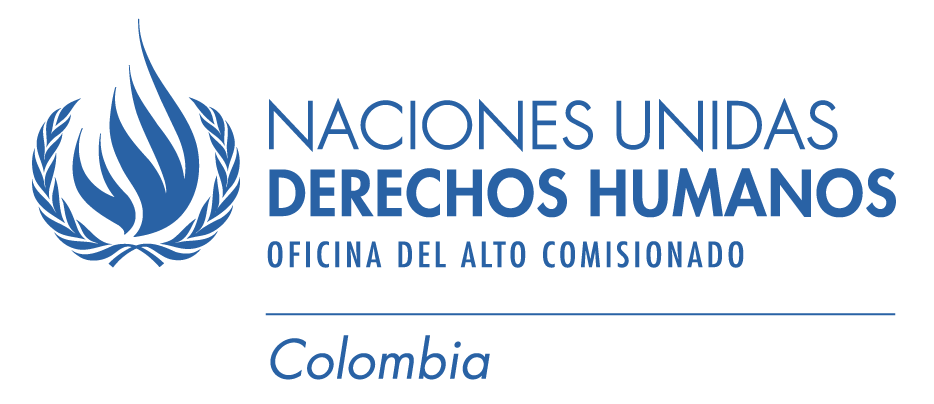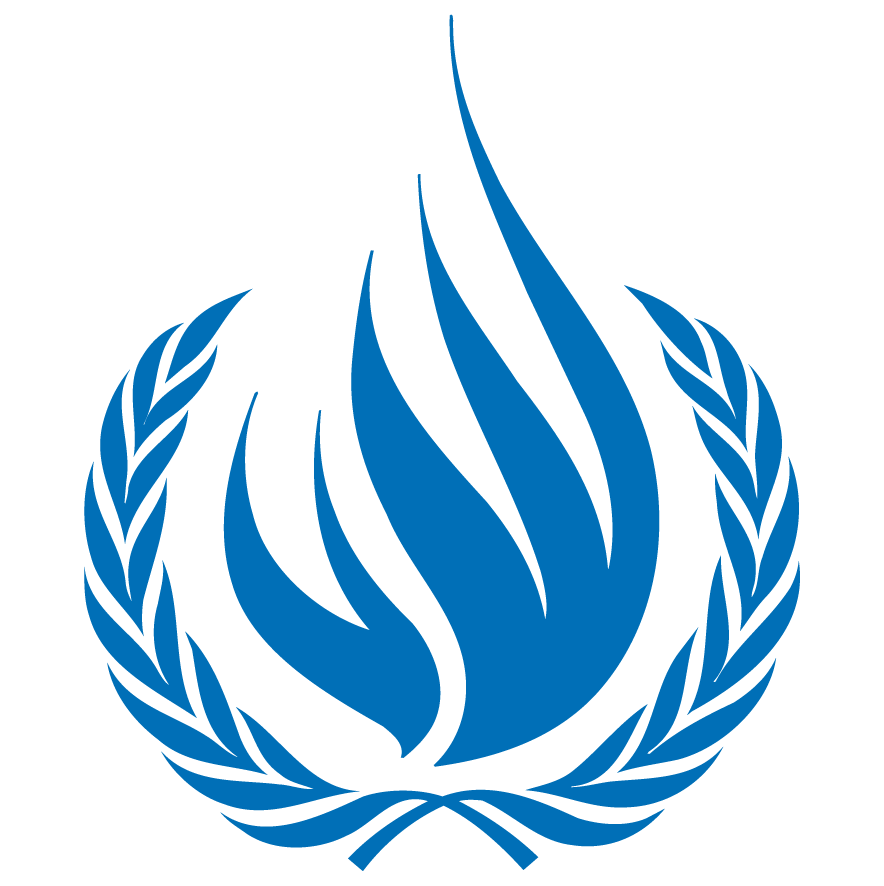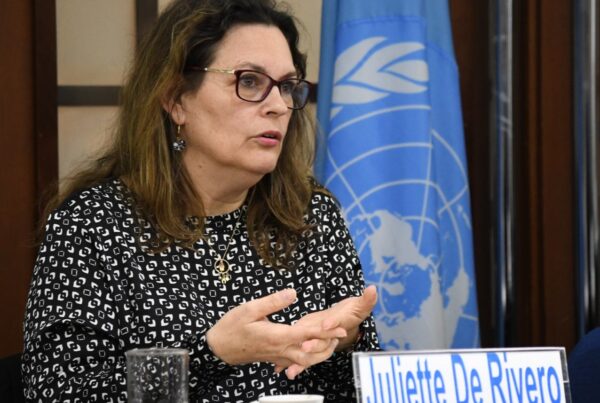Director of the Office in Colombia of the United Nations High Commissioner for Human Rights
Remarks in the panel “The Role of Third Parties and Issues for the International Community” at the Woodrow Wilson Center´s Conference “The Peace Process in Colombia with the Autodefensas Unidas de Colombia-AUC” in Washington D.C., June 28, 2004.
The negotiations between the Colombian government and the country’s illegal armed groups raise several important issues for the international community. These issues are, or should be, in the shared interest of Colombia and the members of the international community, because Colombia is, in the view of the United Nations High Commissioner for Human Rights office in Colombia, an advanced, democratic state governed by the rule of law. There are problems and limitations, to be sure, some of a structural nature and others due to circumstances including the armed conflict itself. But Colombia is a democratic state, with aspirations to develop its democracy and consolidate the rule of law.
Colombia is also an important player in the international community. It has assumed the obligations and values that have been developed and agreed upon by states, in particular the democratic ones, since the Second World War. These values and rules are reflected in the international instruments regarding human rights, international humanitarian law, and international criminal law. Colombia incorporated the obligations of human rights into its 1991 Constitution, one of the most advanced in the region. The Constitutional Court has served as an important guarantor of Colombia’s human rights and other international law commitments.
The instruments governing human rights and international humanitarian law and the more recent developments in international criminal law reflect values but also contain constructive guidelines and rules for how to behave in different situations. The Office in Colombia of the U.N. High Commissioner for Human Rights still hears arguments that human rights and international humanitarian law embody laudable principles, but constitute impediments or straight jackets in the process of negotiating peace. We believe that it is exactly the other way around. In order to overcome an internal armed conflict like the one in Colombia, impunity must not be reproduced or accepted. Impunity has been and still is one of the biggest problems Colombia faces, and undermines and distorts the very principles of a democratic state aspiring to develop the rule of law. The United Nations has frequently indicated that the principles of human rights and international humanitarian law provide the necessary and applicable tools for a state that wishes to negotiate wisely and appropriately with armed illegal groups. But these negotiations must have structure and content. There is no point in negotiating for negotiations’ sake, as has occurred at some points in Colombian history.
The mandate of the Office of the High Commissioner for Human Rights calls for an annual report on the situation of human rights and international humanitarian law, a report that contains constructive and forward-looking recommendations. In the March and April 2004 sessions of the United Nations Commission for Human Rights in Geneva, the Colombian government assumed—that is, accepted– the twenty-seven recommendations contained in this year’s report. One of the crucial recommendations with regard to the internal armed conflict concerned the role of human rights in the peace process:
“The High Commissioner recommends that the Government, the illegal armed groups and representative sectors of civil society, spend no efforts to establish contacts for dialogue and negotiation in order to resolve the internal armed conflict and achieve a lasting peace. The dialogues and negotiations should from the outset take human rights and international humanitarian law into account. The High Commissioner exhorts the Government and Congress to fully honour the fundamental principles of truth, justice and reparation for victims, in all dialogues and negotiations with armed illegal groups.”
In other words, human rights and international humanitarian law should figure prominently in the agenda, and victims’ rights to truth, justice, and reparation should be upheld.
The rights to truth, justice, and reparation need to inform and guide the actions of the government if and when it contemplates offering certain judicial benefits as part of the negotiations with illegal armed groups. This holds true whether the government is negotiating with the autodefensas or paramilitaries, or with guerrilla groups such as the FARC-EP or the ELN.
It is quite possible–indeed likely–that the political content of an agreement between the Colombian government and the various illegal armed groups will vary. This is due, among other factors, to the distinct character and nature of the paramilitary groups, on the one hand, and the guerrilla groups, on the other. But with regard to serious violations or infractions of human rights, international humanitarian law, and international criminal law, the same criteria will have to apply. Otherwise, the negotiations will lack credibility and will fail to create the necessary basis for reconciliation or for the further development of democracy.
Crimes against humanity and war crimes should end. But what makes these crimes even worse is impunity. The existence of impunity serves only to encourage the future committing of serious crimes. Unfortunately, Colombian history has reflected this dynamic all too frequently.
The negotiations with the AUC and other paramilitary groups raise at least two other serious issues. One is that the majority of the leaders of these groups are involved in the drug business. According to very good information, several–if not the majority—of the paramilitary leaders are, first and foremost, major drug traffickers. A second issue concerns the relationship of these groups to the Colombian state. The paramilitaries’ self-assumed and illegal role in the internal armed conflict has led in a number of cases to collusion between paramilitary groups and individual public officials, both civilian and military. When such links exist, they contaminate the state and undermine its pretensions to uphold the rule of law.
It is thus even more crucial for the Colombian state and the government of President Uribe to be clear and firm in the negotiations with the AUC and other paramilitary groups, and consistent and firm in assuring that any existing links between public officials and members of paramilitary groups be severed.
One of the recommendations of the U.N. High Commissioner for Human Rights addresses this phenomenon. And it is, indeed, the declared policy of President Uribe that no such links can be tolerated or accepted. From the perspective of the High Commissioner’s Office in Bogotá, it is crucial that the international community continue to support the Colombian state and President Uribe in the implementation of this and other recommendations. Some progress has been made, but much, much more needs to be done: the links with paramilitary groups still exist. These links must be cut in order to decontaminate the state and strengthen the rule of law, and to improve the conditions for negotiating the demobilization of the AUC and other paramilitary groups. Severing such links would also positively influence the human rights situation.
The issue of judicial benefits for members of illegal armed groups who demobilize came to the forefront of public debate when the Colombian government presented its Ley de Alternatividad Penal in August 2003. The government presented this initial version with little or no consultation. Without entering into great detail, one can say that the initial bill failed to incorporate the guiding principles of human rights and international humanitarian law. Fortunately, the government presented a revised bill in April 2004. The revised draft followed much public and international debate, and the government, to a certain extent, sought advice, including from the office of the High Commissioner for Human Rights. Wisely, the Colombian government affirmed that the newly-presented bill was also a draft and open for debate. The April draft reflected a healthy and positive evolution from the earlier version with regard to the rights to truth, justice, and reparations for victims. Further refinement is still needed, however, and the draft can still be improved.
The key to peace and development in Colombia centers on increased respect for human rights. Negotiations with the illegal armed groups are necessary but should reflect human rights and international humanitarian law norms. The U.N. High Commissioner for Human Rights is convinced that it is possible to carry out meaningful and successful negotiations with illegal armed groups that put an end to the disastrous internal conflict. The challenge, however, is great, and broad commitment is needed. Colombia’s democratic forces need to forge greater unity in the search for peace, on the basis of shared values that reflect and in practice incorporate existing international human rights norms. If that were to occur, then one could guarantee sustained international support for Colombia’s efforts to overcome its armed conflict.
The Colombia Office of the United Nations High Commissioner for Human Rights will continue to work within the framework of its mandate. We are encouraged and heartened by the constructive results of the United Nations Human Rights Commission’s deliberations in Geneva in March and April 2004. This work was summarized in a consensus document issued by the fifty-three governments of the Commission and the government of Colombia. The Chairperson’s statement says that
“The Commission continues to attach great importance to President Uribe’s commitment to seek a negotiated solution to the conflict. It believes a comprehensive negotiated solution would bring about a lasting peace in the framework of good government, its democracy, the rule of law, and respect for human rights. The Commission, while taking careful note of the agreement between the government of Colombia and the United Self-Defense groups of Colombia for total demobilization of paramilitary forces by 2005, expresses its deep concern at the lack of progress towards a comprehensive peace strategy. It stresses the need for illegal armed groups to cease hostilities and undertake a constructive and significant dialogue. It also underlines the role that is played by the international community, in particular the United Nations, through the Special Adviser to the Secretary-General for Colombia.”
The document also underlines the role in Colombia’s peace process that is played by the international community, in particular the United Nations, through the special advisor for Colombia to the Secretary-General. The Commission also emphasizes the importance of the principles of truth, justice, and reparation in a comprehensive peace strategy.
The Commission’s statement concludes by reminding the government of Colombia
“of its commitment to take into account and implement recommendations contained in the statement by the Chairperson. The Commission calls for the prompt implementation by all relevant parties of the concrete priority recommendations for 2004 of the High Commissioner for Human Rights. The Commission welcomes the commitment of the government of Colombia to work in a constructive spirit with the Office in Colombia of the High Commissioner for Human Rights, to examine the implementation and evaluation of the recommendation.”
And the Commission further calls on the government of Colombia “to avail itself fully of the advisory services of the Office in Colombia of the High Commissioner for Human Rights, with a view to ensuring that norms and measures adopted by Colombian institutions are consistent with international law on human rights and that the recommendations of the High Commissioner for Human Rights are taken into account.”
The coming months are of great importance for Colombia, holding great promise as well as great risk. We hope that the possibilities win out, and that with the help of the entire international community, Colombia can begin to overcome the armed conflict that has caused so much devastation for so many years.
https://hchr.hrev.org/wp-content/uploads/2004/06/po0458.pdf






